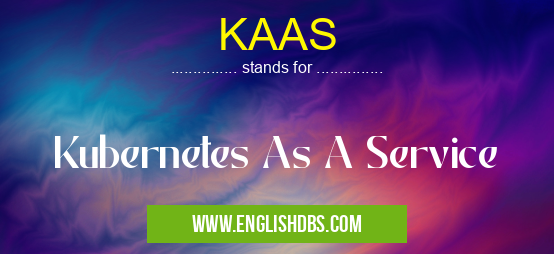What does KAAS mean in UNCLASSIFIED
Kubernetes as a Service (KAAS) is an efficient, secure and cost-effective way of implementing and managing applications on Kubernetes clusters. It allows organizations to make use of the cloud's scalability and agility, while keeping their systems safe and performing optimally. KAAS provides users with a range of automation capabilities, including automated deployment, scaling, monitoring, and management of their applications running on Kubernetes clusters. This eliminates the need for manual intervention required in some traditional IT environments.

KAAS meaning in Unclassified in Miscellaneous
KAAS mostly used in an acronym Unclassified in Category Miscellaneous that means Kubernetes As A Service
Shorthand: KAAS,
Full Form: Kubernetes As A Service
For more information of "Kubernetes As A Service", see the section below.
Overview
Kubernetes is an open source platform for running containerized workloads. As such, it provides users with the flexibility to run their applications on any cloud infrastructure or on-premises data centers with both public and private cloud models. KAAS makes it easy to configure and manage one or multiple Kubernetes clusters using its web-based console which allows users to deploy applications, monitor usage and take corrective actions when needed. Additionally, KAAS supports various open source tools that can be used to automate tasks like deployment pipelines, security scanning, logging & analytics etc., thereby allowing organizations to focus more on building better apps that deliver higher value.
Benefits
KAAS comes with many advantages for businesses looking to transition into the world of containers. Firstly, it helps minimize operational costs by providing a unified management platform that simplifies application deployment and maintenance processes while ensuring performance uptime via automation capabilities such as autoscaling. Secondly, with its support for both public clouds like AWS and GCP along with private ones like OpenShift Container Platform (OCP) & IBM Cloud Private (ICP), organizations can quickly move away from legacy architectures towards modern DevOps practices that enable rapid development cycles without compromising on security standards or control over data sovereignty concerns arising due to distributed workloads across different platforms.
Essential Questions and Answers on Kubernetes As A Service in "MISCELLANEOUS»UNFILED"
What Is Kubernetes As A Service (KAAS)?
Kubernetes as a Service (KaaS) is a cloud-based platform offering the ability to deploy, manage, and orchestrate containerized applications using the open source Kubernetes framework. KaaS helps organizations manage their workloads in an efficient and cost-effective manner.
What Benefits Does KAAS Offer?
KaaS offers a range of benefits that allow organizations to maximize their resource utilization and optimize their costs when deploying and managing containerized applications. These benefits include simplified operations, scalability, agility, reliability, and improved resource utilization.
Who Can Use KAAS?
KaaS can be used by any organization looking to deploy and manage containerized applications with ease. It is particularly useful for those organizations who are looking to reduce deployment time or take advantage of its cost-saving features.
How Is KAAS Different From Other Cloud Platforms?
While other cloud platforms offer the ability to deploy applications, they often require manual efforts in order to manage them efficiently. On the other hand, KaaS provides a comprehensive solution for managing containerized applications with automated deployment and management capabilities.
Are There Any Security Features With KAAS?
Yes - security is one of the key features of KaaS. It provides multiple layers of security to ensure that critical data remains protected from unauthorized access or manipulation. Additionally, it also supports audit logging for further assurance of safety and compliance requirements being met.
Does KAA Have Any Pricing Model?
Yes - pricing models vary depending on the usage needs of each customer. Generally speaking; however, there are usually some flexibility options available in terms of pay-as-you-go schemes or bundled subscription packages based on resources required and duration of usage periods etc.
Can I Host Multiple Applications On The Same Cluster With KAA?
Yes — depending on the infrastructure setup you opt for; you can choose to have multiple applications running on one cluster as long as they do not interfere with each other's resources or performance issues arise due to overloading situations etc.
Final Words:
In summary, KAAs offers significant cost savings compared to hosted solutions while providing organizations the agility they require from complex infrastructures running distributed applications at scale. Moreover, its streamlined architecture enables developers to quickly build and deploy resilient applications while gaining more control over operations using advanced automation features like auto-scaling through an intuitive web console interface. For any organization planning its transition into containerized infrastructures - whether public or private - KAAs promises an efficient end-to-end solution in terms of both cost savings as well as productivity gains.
